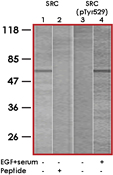Anti-Src(S19-63BR)
FOR BULK ORDER REQUESTS PLEASE CONTACT US
Description :Rabbit Polyclonal Antibody
Species :
Tag :
Expression System:
Sequence :
Specificity :Recognizes the Src protein
Cited Applications :WB, IHC
Cross Reactivity :Human, Mouse and Rat
Host / Isotype / Clone# :Rabbit, IgG
Immunogen :The antiserum was produced against synthesized non-phosphopeptide derived from human Src around the phosphorylation site of tyrosine 529 (P-Q-YP-Q-P).
Purification :Affinity chromatography
Stability :Store at 4oC (add 0.1% NaN3) for several months, and at -20oC for longer periods. For optimal storage, aliquot target into smaller quantities after centrifugation and store at recommended temperature. For most favorable performance, avoid repeated handling and multiple freeze/thaw cycles.
Sample Data :Western Blot analysis of extracts from 293 cells using Anti-Src (Lane 1 and 2) and Anti-phospho-Src (Tyr529) (Lane 3 and 4).
Scientific Background :Src family belongs to non-receptor tyrosine kinases. Src was originally identified as a transforming protein of the Rous sarcoma virus (RSV) that had enzymatic ability to phosphorylate tyrosine in protein substrates (1). Src is overexpressed and activated in a large number of human malignancies and has been linked to the development of cancer and progression to distant metastases (2). In addition to increasing cell proliferation, a key role of Src in cancer seems to be the ability to promote invasion and motility, functions that might contribute to tumour progression.
References :
1. Collett, M S. et al: Protein kinase activity associated with the avian sarcoma virus src gene product. Proc Natl Acad Sci U S A. 1978 Apr;75(4):2021-4.
2. Jacobs, C. et al: Expression of pp60c-src protein kinase in adult and fetal human tissue: high activities in some sarcomas and mammary carcinomas. Cancer Res. 1983 Apr;43(4):1696-702.
Product Sheets (By Lot #) :
Research Areas :Angiogenesis, Apoptosis/Autophagy, Cancer, Cytoplasmic Tyrosine Kinases, ERK/MAPK Pathway, Inflammation, Invasion/Metastasis, JAK/STAT Pathway, Cancer, Inflammation, ERK/MAPK Pathway, JAK/STAT Pathway, Apoptosis/Autophagy, Angiogenesis, Invasion/Metastasis, Cytoplasmic Tyrosine Kinases
